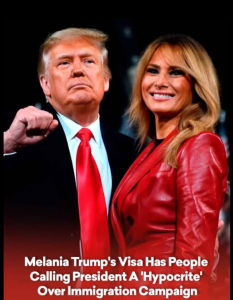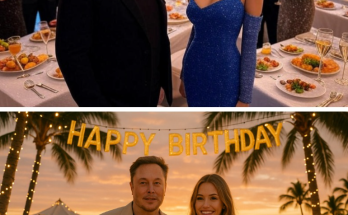🎯 What Is the EB‑1 “Einstein” Visa?
The EB‑1 visa is aimed at immigrants with extraordinary ability in fields like science, arts, business, education, or athletics. Applicants must show sustained national or international acclaim—say, Nobel Prizes, Olympic medals, or other high honors
In 2001, Melania Trump, then still Melania Knauss, received her green card via EB‑1, shortly after arriving in the U.S. following a modeling career in Slovenia and Italy. She later became a U.S. citizen in 2006
🧭 Crockett’s Question: Does Melania Fit the Criteria?
At the hearing, Rep. Crockett asked, “Last time I checked, the first lady had none of those accolades,” referencing achievements like Nobel prizes or Olympic medals
She noted that in her home country of Slovenia, only five people received EB‑1 visas that year—signaling how selective the process was Her implication: if someone of Melania’s background qualifies under these rules, then maybe the rules aren’t being applied fairly.
📌 Trump’s Defense (and Criticism)
Supporters argue:
-
The EB‑1 criteria are broad and subjective—not strictly Nobel-level; prominent models with media presence can qualify
-
Alex Nowrasteh from the Cato Institute joked, “Not everybody could marry Donald Trump, and that’s quite an achievement”, implying her high-profile modeling and connections could count
Critics counter:
-
Melania’s early visa timeline is murky. She arrived on a B‑1/B‑2 tourist visa in August 1996 and started working—reportedly without proper work authorization—before switching to an H‑1B in October 1996
-
Her claims of following visa protocol—flying back regularly and “never staying without papers”—are contradicted by modeling jobs before proper visa issuance
❗ The Hypocrisy Argument
Two glaring points fuel the “hypocrite” accusations:
-
Trump’s tough stance on illegal immigration, family chains, and visa fraud.—His administration aggressively pursued migrants, yet Melania—and later her parents—benefited from systems he criticized
-
Melania’s EB‑1 status: If models without top-tier awards can secure “extraordinary ability” visas, it raises questions about equitable application of immigration rules
🔎 Hidden Complexity and Broader Debate
-
Subjectivity of “extraordinary”: Immigration lawyers point out EB‑1 adjudications are a matter of interpretation. High-profile work, magazine covers, media presence—all play a role .
-
Chain migration: Melania later sponsored her parents—exactly the policy Trump has labeled “evil”—highlighting a personal contradiction Selective outrage: Vox argued Trump’s crusade against immigrants is more about identity than legal status—white European immigrants like Melania don’t trigger his ire
🗣️ Public and Political Reactions
On social media and in congressional halls, responses range from stunned to outraged:
-
Some see blog posts and commentary vilifying Melania for receiving a visa “neither she nor her husband deserved” Others dismiss her past jobs as trivial, reflecting broader concerns: “Who cares”? Trump supporters reportedly were largely uninterested when these past visa questions surfaced .
🧭 Why It Matters in 2025
Even though the EB‑1 was granted decades ago, Crockett’s scrutiny comes at a pivotal time:
-
The hearing was part of a broader investigation into immigration policy and potential nepotism.
-
As the Biden administration reassesses high-skill visas, this case underscores the need for transparency and consistency in immigration adjudication.
-
The optics of using a selective visa for personal advantage while denouncing similar routes for others matter deeply in public discourse.
✅ Final Take
-
Legally, Melania did apparently meet broad criteria—prominent modeling, international recognition, magazine covers
-
Narratively, however, the optics are stark: a fiercely anti-immigrant president’s own family benefited from elite immigration pathways that he criticized publicly.
-
Politically, it amplifies charges of hypocrisy: harsher rules for some, leniency for others—particularly those with power and connections.
At its core, this isn’t just about a visa—it’s symbolic. It’s about whether our immigration system operates by consistent standards, or bends under power and privilege.
Do you think Melania’s case fits within the intended spirit of an “extraordinary ability” visa, or does it reveal a deeper problem in how immigration rules are applied? Let’s dive into that.
